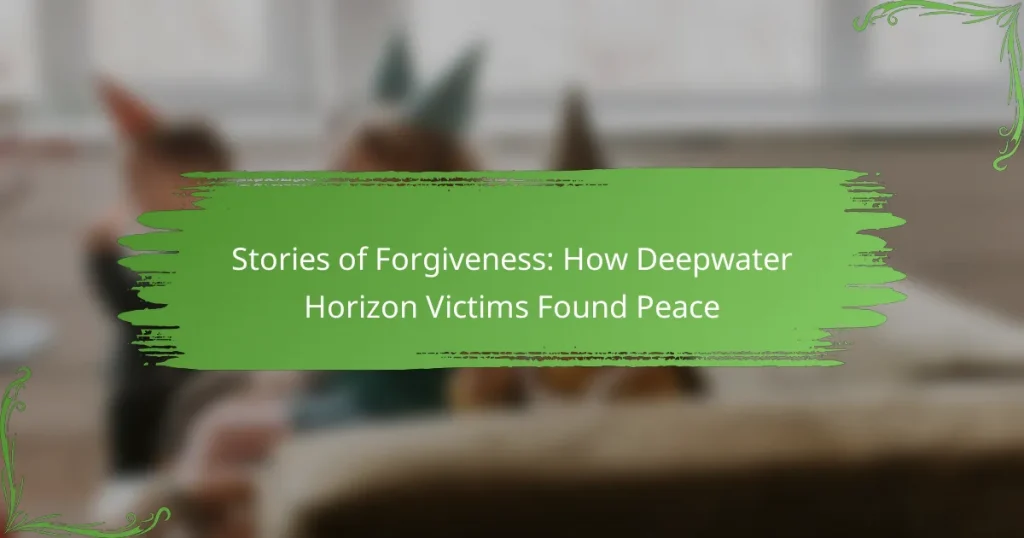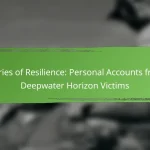The article focuses on the stories of forgiveness among victims of the Deepwater Horizon disaster. It highlights how many individuals have experienced profound loss and trauma, yet some have chosen to pursue healing by letting go of anger and resentment. Victims often engage in personal reflection and community support, which aids their emotional recovery. The piece discusses how forgiveness can lead to improved mental health and a sense of peace, emphasizing the transformative power of empathy and advocacy in the aftermath of tragedy. Overall, these narratives illustrate forgiveness as a crucial element in the journey towards resilience and personal growth.
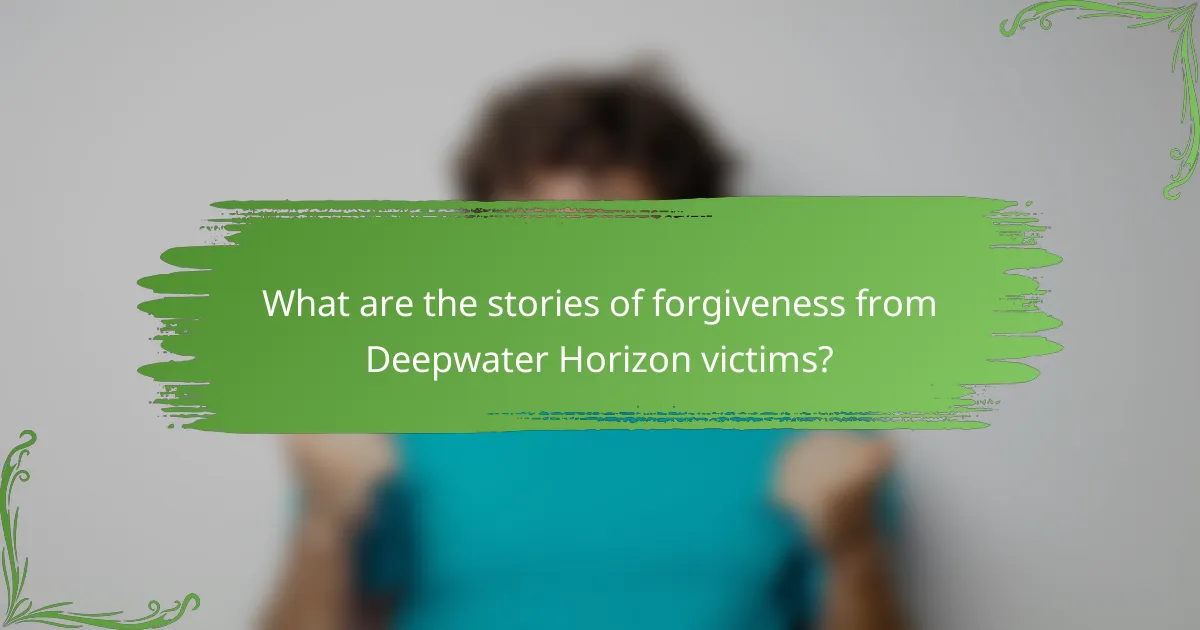
What are the stories of forgiveness from Deepwater Horizon victims?
It is difficult to pinpoint specific stories of forgiveness from Deepwater Horizon victims. Many victims experienced profound loss and trauma due to the disaster. Some individuals have expressed a desire to move forward rather than harbor resentment. For example, a few families of victims have publicly stated they want to focus on healing. They emphasize the importance of community support in their journeys. Other victims have found solace in advocacy, pushing for stricter regulations to prevent future disasters. These actions reflect a form of forgiveness, as they aim to transform pain into positive change. However, comprehensive documentation of specific forgiveness stories remains limited.
How did the Deepwater Horizon disaster impact victims’ lives?
The Deepwater Horizon disaster severely impacted victims’ lives through economic, environmental, and health-related consequences. Many individuals lost their jobs due to the oil spill’s effect on local industries, particularly fishing and tourism. The economic downturn resulted in significant financial strain for families dependent on these sectors. Environmental damage led to long-lasting effects on the ecosystem, affecting livelihoods and health. Victims reported increased stress, anxiety, and health issues linked to the disaster. The spill contaminated local waters, impacting seafood safety and availability. Many residents faced challenges in seeking compensation for their losses. The psychological toll included feelings of helplessness and loss of community. Overall, the disaster altered the fabric of affected communities and the lives of individuals within them.
What were the immediate effects of the disaster on the victims?
The immediate effects of the Deepwater Horizon disaster on the victims included physical injuries, emotional trauma, and economic hardship. Many victims suffered from severe injuries due to the explosion and subsequent fire. The emotional impact was profound, with many experiencing anxiety, depression, and post-traumatic stress disorder. Economically, the disaster led to job losses for workers in the fishing and tourism industries. The spill contaminated local waters, affecting livelihoods and community stability. According to a report by the National Commission on the BP Deepwater Horizon Oil Spill, these effects were widespread and long-lasting for the affected communities.
How did the disaster change the community dynamics?
The disaster significantly altered community dynamics by fostering collaboration among residents. In the aftermath of the Deepwater Horizon oil spill, communities faced economic and environmental challenges. This crisis prompted individuals to unite for collective recovery efforts. Local organizations and support groups emerged to address the needs of affected families. Increased communication among residents led to stronger social bonds. The shared experience of hardship encouraged empathy and mutual support. Additionally, community meetings became common to discuss recovery strategies. Ultimately, the disaster transformed previously fragmented communities into more cohesive and resilient networks.
Why is forgiveness important in the context of the Deepwater Horizon tragedy?
Forgiveness is important in the context of the Deepwater Horizon tragedy because it facilitates emotional healing for victims. The 2010 disaster caused immense suffering and loss for individuals and communities. Survivors and affected families often faced overwhelming grief and anger. Forgiveness allows them to move beyond resentment and find peace. Studies show that forgiveness can reduce stress and improve mental health. By forgiving, victims can reclaim their lives and focus on recovery. This process is essential for rebuilding relationships and community trust. Ultimately, forgiveness contributes to long-term emotional resilience in the aftermath of tragedy.
How can forgiveness lead to healing for the victims?
Forgiveness can lead to healing for victims by allowing them to release emotional burdens. When victims forgive, they often experience reduced feelings of anger and resentment. This shift can improve mental health and emotional well-being. Studies show that forgiveness can lower anxiety and depression levels. Victims may also find a sense of closure through the act of forgiving. This closure can lead to a renewed sense of control over their lives. In the context of the Deepwater Horizon disaster, victims who engaged in forgiveness reported improved emotional resilience. Overall, forgiveness serves as a pathway for victims to reclaim their peace and move forward.
What psychological benefits does forgiveness provide in traumatic situations?
Forgiveness in traumatic situations offers significant psychological benefits. It promotes emotional healing and reduces feelings of anger and resentment. By letting go of negative emotions, individuals can experience improved mental well-being. Research indicates that forgiveness can lower anxiety and depression levels. A study published in the Journal of Counseling Psychology found that individuals who practice forgiveness report higher life satisfaction. Forgiveness also fosters resilience, enabling individuals to cope better with stress. Furthermore, it enhances interpersonal relationships, contributing to social support. Overall, forgiveness serves as a powerful tool for psychological recovery in the aftermath of trauma.
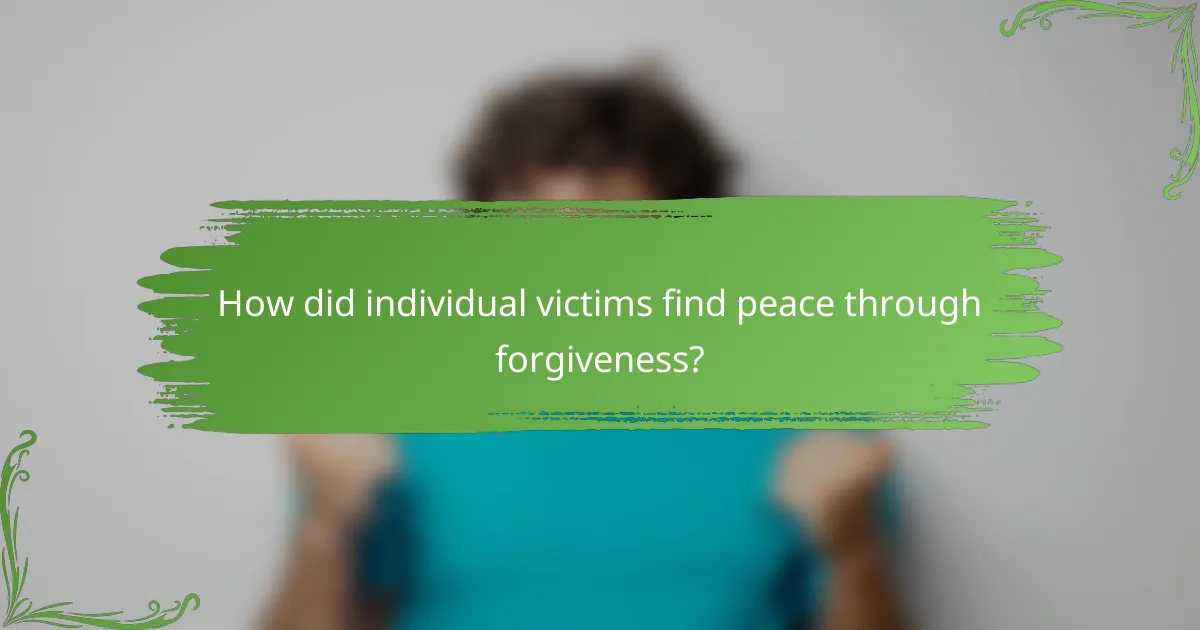
How did individual victims find peace through forgiveness?
Individual victims found peace through forgiveness by reframing their experiences. Forgiveness allowed them to let go of anger and resentment. Many victims engaged in personal reflection to process their emotions. They often expressed their feelings through writing or support groups. This helped them articulate their pain and move towards healing. Research indicates that forgiveness can reduce stress and improve mental health. Victims reported feeling lighter and more hopeful after forgiving. This emotional release contributed to their overall sense of peace.
What personal stories exemplify the journey of forgiveness?
Personal stories that exemplify the journey of forgiveness include those of Deepwater Horizon victims. One notable story is that of a fisherman who lost his livelihood due to the oil spill. He chose to forgive BP for the devastating impact on his family. His journey involved attending community meetings and engaging in dialogue with company representatives. This process helped him find closure and rebuild his life.
Another example is a woman who lost her husband in the disaster. She initially felt anger and resentment towards BP. Over time, she participated in restorative justice programs. These programs allowed her to express her grief and hear from company officials. Ultimately, she found a path to forgiveness that brought her peace.
These stories illustrate the complex emotions involved in forgiveness. They highlight the importance of communication and understanding in the healing process. Victims of the Deepwater Horizon disaster have shown that forgiveness can lead to personal growth and emotional resilience.
How did these individuals confront their pain and loss?
These individuals confronted their pain and loss through various coping mechanisms. They engaged in community support groups to share their experiences. Many sought therapy to process their grief and trauma. Some found solace in creative outlets, such as writing or art. Others participated in memorial events to honor their loved ones. They also focused on rebuilding their lives through new goals and aspirations. Faith and [censured] played a significant role for many in finding peace. Overall, these strategies helped them navigate their emotional challenges and foster resilience.
What steps did they take towards forgiveness?
The victims of the Deepwater Horizon disaster took several steps towards forgiveness. They engaged in open dialogue with BP representatives. This dialogue aimed to address grievances and seek acknowledgment of their suffering. Many victims participated in support groups to share their experiences. These groups fostered a sense of community and understanding. Some victims sought counseling to process their emotions and trauma. This professional help guided them in navigating their feelings of anger and loss. Additionally, many victims chose to focus on rebuilding their lives rather than dwelling on past grievances. This proactive approach helped them find personal peace and closure.
What role did community support play in the forgiveness process?
Community support significantly facilitated the forgiveness process for Deepwater Horizon victims. It provided emotional backing and a sense of belonging. Victims often shared their experiences with others who faced similar challenges. This connection fostered understanding and empathy among individuals. Groups formed to discuss their feelings and grievances. Such gatherings created a safe space for healing. Research indicates that social support enhances emotional resilience. Victims who felt supported were more likely to move towards forgiveness. This collective journey helped individuals find peace and closure.
How did support groups facilitate healing and forgiveness?
Support groups facilitated healing and forgiveness by providing a safe space for individuals to share their experiences. Members found comfort in knowing they were not alone in their struggles. This collective sharing helped to validate feelings and foster empathy among participants. Support groups encouraged open dialogue about pain and loss, which promoted emotional release. Research indicates that such environments enhance emotional well-being and resilience. For example, a study by the American Psychological Association highlights that group therapy can significantly reduce symptoms of anxiety and depression. Additionally, shared narratives often lead to collective healing, as individuals learn from each other’s coping strategies. Overall, support groups played a crucial role in the journey toward forgiveness for Deepwater Horizon victims.
What initiatives were created to promote forgiveness among victims?
Initiatives created to promote forgiveness among Deepwater Horizon victims include community support programs and restorative justice workshops. These programs aim to facilitate healing and reconciliation. They provide a platform for victims to share their experiences and emotions. Workshops often include guided discussions led by trained facilitators. Victims engage in activities that promote empathy and understanding. Support groups also play a crucial role in building connections among victims. These initiatives foster a sense of community and shared healing. Research indicates that such programs can significantly enhance emotional well-being and promote forgiveness.
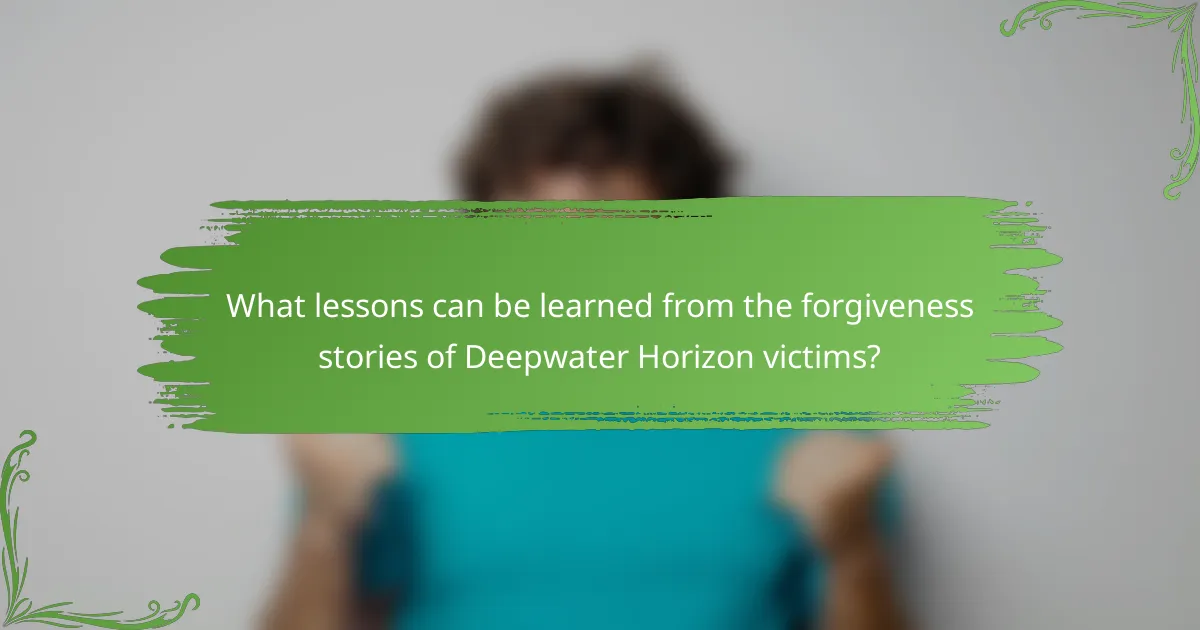
What lessons can be learned from the forgiveness stories of Deepwater Horizon victims?
Forgiveness stories of Deepwater Horizon victims illustrate the importance of emotional healing. Victims often found peace by letting go of anger and resentment. This process allowed them to reclaim their lives after trauma. Many victims emphasized the value of empathy towards those responsible. They recognized that forgiveness can be a personal journey, not necessarily about absolving others. Stories reveal that forgiveness can lead to community support and resilience. Research indicates that forgiveness contributes to mental well-being and reduces stress. Overall, these narratives highlight forgiveness as a powerful tool for recovery and personal growth.
How can forgiveness be applied in other traumatic events?
Forgiveness can be applied in other traumatic events by promoting emotional healing and reducing resentment. It allows individuals to reclaim their peace and move forward. For instance, survivors of violent crimes often find solace in forgiving their perpetrators. Research shows that forgiveness can lower stress levels and improve mental health. A study published in the Journal of Traumatic Stress found that forgiveness is linked to lower rates of depression among trauma survivors. Additionally, in cases of natural disasters, survivors who practice forgiveness report higher levels of life satisfaction. Forgiveness fosters empathy and understanding, aiding recovery from trauma.
What strategies can individuals use to foster forgiveness in their lives?
Individuals can foster forgiveness by practicing empathy. Understanding the perspective of the person who caused harm can facilitate healing. Another strategy is to express emotions constructively. Writing about feelings can help process anger and resentment. Additionally, setting boundaries is crucial. This allows individuals to protect themselves while moving forward. Engaging in mindfulness practices can also aid forgiveness. Mindfulness helps individuals remain present and reduce negative thoughts. Seeking support from friends or professionals can provide guidance. Support systems can offer different viewpoints and coping strategies. Lastly, focusing on personal growth is essential. Personal development shifts attention from the past to future possibilities. These strategies collectively promote a path toward forgiveness and emotional well-being.
How can communities support individuals in their journey towards forgiveness?
Communities can support individuals in their journey towards forgiveness by providing emotional and social support. This can include creating safe spaces for open dialogue about feelings and experiences. Support groups can foster connection among individuals facing similar challenges. Community-led workshops can offer tools and strategies for processing emotions and understanding forgiveness. Access to mental health resources is crucial for individuals seeking professional guidance. Events that celebrate stories of forgiveness can inspire hope and resilience. Research indicates that social support significantly enhances emotional well-being during healing processes. Therefore, community involvement plays a vital role in facilitating forgiveness journeys.
What resources are available for those seeking forgiveness and healing?
Resources available for those seeking forgiveness and healing include counseling services, support groups, and literature on forgiveness. Counseling services provide professional guidance to process emotions and experiences. Support groups foster community and shared experiences among individuals facing similar challenges. Literature, such as books and articles, offers insights and strategies for understanding forgiveness. Research indicates that these resources can significantly aid emotional recovery and promote healing. For instance, studies show that participation in support groups can enhance emotional well-being and resilience.
Which organizations provide support for victims of disasters?
Organizations that provide support for victims of disasters include the American Red Cross, FEMA, and the Salvation Army. The American Red Cross offers emergency assistance and disaster relief. FEMA provides federal assistance and resources for recovery. The Salvation Army delivers food, shelter, and emotional support. These organizations are well-established and have a long history of helping disaster victims. They mobilize quickly in response to emergencies. Their services are crucial for recovery and rebuilding efforts.
What tools and practices can help individuals navigate their forgiveness journey?
Tools and practices that can help individuals navigate their forgiveness journey include journaling, meditation, and support groups. Journaling allows individuals to express emotions and reflect on their experiences. This practice can clarify feelings and promote healing. Meditation helps cultivate mindfulness and reduces stress. It encourages individuals to focus on the present moment. Support groups provide a safe space for sharing stories and receiving encouragement. Engaging with others facing similar challenges fosters connection and understanding. Cognitive-behavioral techniques can also aid in reframing negative thoughts related to the offense. These methods collectively contribute to emotional processing and the journey toward forgiveness.
The main entity of this article is the stories of forgiveness from victims of the Deepwater Horizon disaster. The article explores how individuals affected by the tragedy navigated their emotional pain through forgiveness, highlighting personal journeys and community support as essential elements in the healing process. It discusses the immediate and long-term impacts of the disaster, the psychological benefits of forgiveness, and the role of support groups and initiatives in fostering emotional resilience. Additionally, the article underscores the importance of forgiveness in rebuilding lives and communities after trauma.
